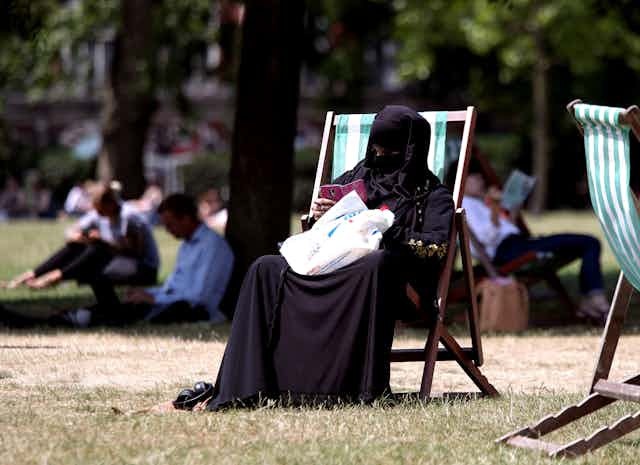People in the UK will be soon be required by law to wear masks in shops to prevent the spread of coronavirus. This follows the introduction of mandatory face coverings on public transport in June.
There is evidence that supports the public health benefits of wearing face coverings in public. But the UK government and public have been slow to accept masks as a pillar of the country’s coronavirus strategy. This should perhaps come as no surprise after two decades of negative messaging about face coverings, largely targeting Muslim women.
Since 9/11, Muslims in the west have endured constant scapegoating and vilification for their religious and lifestyle choices. This includes the wearing of the hijab, burqa, and niqab – different types of hair and face covering.
These garments have been attacked by politicians, including the UK prime minister himself, often characterised as impeding communication, being non-British and representing an anti-western patriarchal culture.
Banning the burqa, mandating the face mask
The fact that Boris Johnson is now calling for face coverings to be imposed is particularly ironic given his past comments on the subject.
When he was foreign secretary in 2018, Johnson wrote in his column in the Telegraph newspaper that while he opposed a ban on Muslim face coverings, he nonetheless felt “entitled” to see the faces of his constituents, and likened women who wore the niqab to letterboxes and bank robbers. “Human beings must be able to see each other’s faces and read their expressions,” he wrote. “It’s how we work.”

These beliefs are not restricted to the Conservative Party. In 2006, Labour foreign secretary Jack Straw wrote about his encounter with a Muslim couple, including a woman who covered her face, describing the “incongruity between the … entirely English accent, the couple’s education (wholly in the UK) - and the fact of the veil”. In doing so, he further cemented the notion that face coverings cannot be English.
For at least a decade there have been calls to ban Muslim face coverings in the UK. In the aftermath of the Brexit referendum in 2016, more than half the British population said they supported a burqa ban. Many countries across Europe have done so despite negligible numbers of people who are affected by such a policy.
In an act of arguable hypocrisy, France, the first country to ban face coverings in 2011, made them mandatory this month to prevent the spread of coronavirus. Face masks are now required in all indoor public spaces in France from August, but the burqa remains banned.
This means fines can be imposed for those who are not covering their face, but also for those whose face coverings are deemed to be religious in nature. In the UK, however, religious clothing can be used as the mandatory face covering in shops.
Face coverings and ‘freedom’
The evidence for wearing a face mask in public to prevent the spread of coronavirus is clear, and research has shown that most face coverings, including the niqab, do not impede communication.
But the repeated association of Muslim women’s dress with lacking freedom and being controlled seems to have resulted in a psychological barrier around the use of masks. In a recent viral video, an American woman screams, “We don’t cover our face in America. They don’t control us. We’re Americans!”
There are also echoes of the association between face coverings and stereotypes of “submissive” Muslim women. A recent preprint study – which has yet to be peer-reviewed – shows that men are less likely to wear a face mask, with some believing it to be a “sign of weakness”.

In a bizarre act of parallel solidarity, many anti-maskers are protesting with the phrase, “My body, my choice” – a feminist slogan about bodily autonomy that Muslim women have used to demand their right to cover their face or hair.
The truth is that Muslim women have always had agency in their choice of what they wear, and the reasons for their choices are manifold, as my research has shown. Some women may well be pressured by their husbands to wear the hijab, just as some western women are pressured to dress in ways they don’t want to by their partners. This is an issue of misogyny, not one of religion.
Now we find ourselves in a situation where politicians, who have sought to use the personal dress codes of Muslim women to portray them as pitiful and controlled, have a battle on their hands to convince the population that masks do not restrict communication, are not a sign of coercion, and are actually a marker of being part of an integrated community where people care for each other.
As we move towards face masks becoming more widely accepted, we can only hope the positive messages of unity that are associated with preventing coronavirus infection now can persist in the longer term and be extended to all who cover their faces, no matter the reason.

